人教版(2019)选择性必修 第四册Unit 4 Sharing Reading and Thinking课件(共70张PPT)
文档属性
| 名称 | 人教版(2019)选择性必修 第四册Unit 4 Sharing Reading and Thinking课件(共70张PPT) | 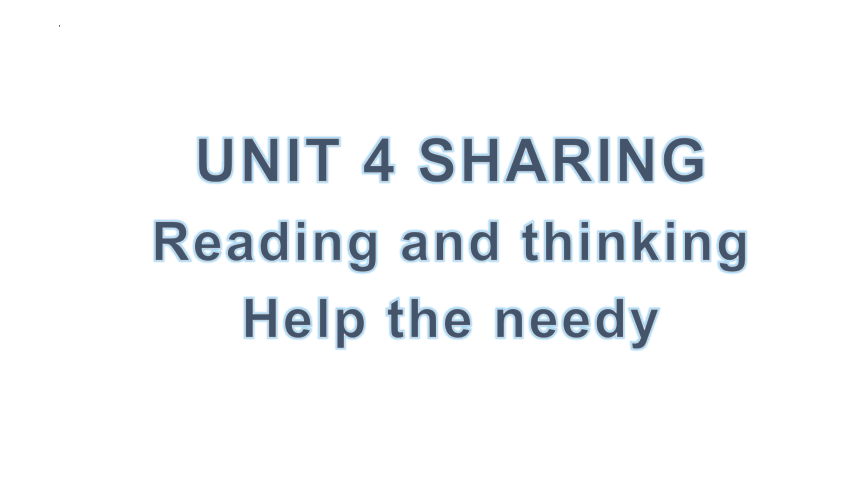 | |
| 格式 | pptx | ||
| 文件大小 | 30.1MB | ||
| 资源类型 | 教案 | ||
| 版本资源 | 人教版(2019) | ||
| 科目 | 英语 | ||
| 更新时间 | 2023-10-23 14:43:09 | ||
图片预览

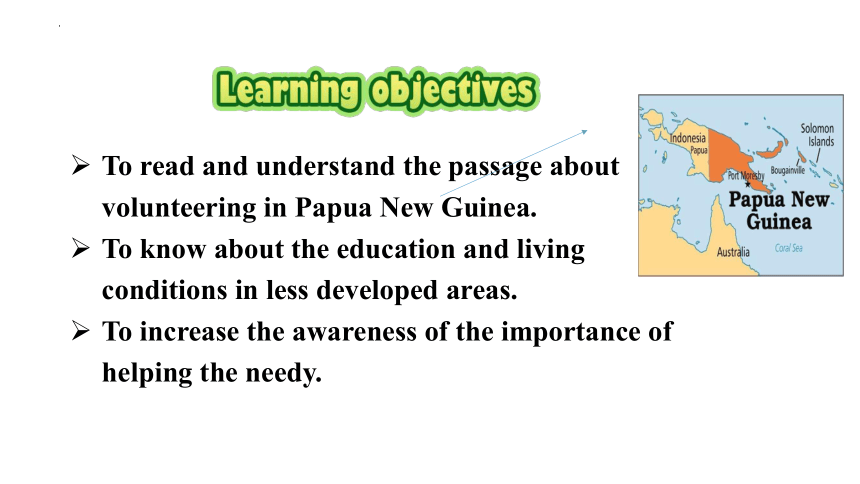
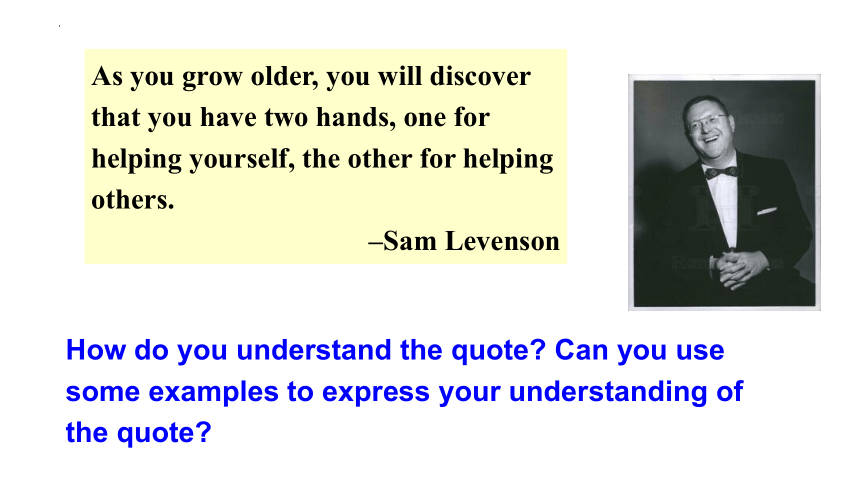

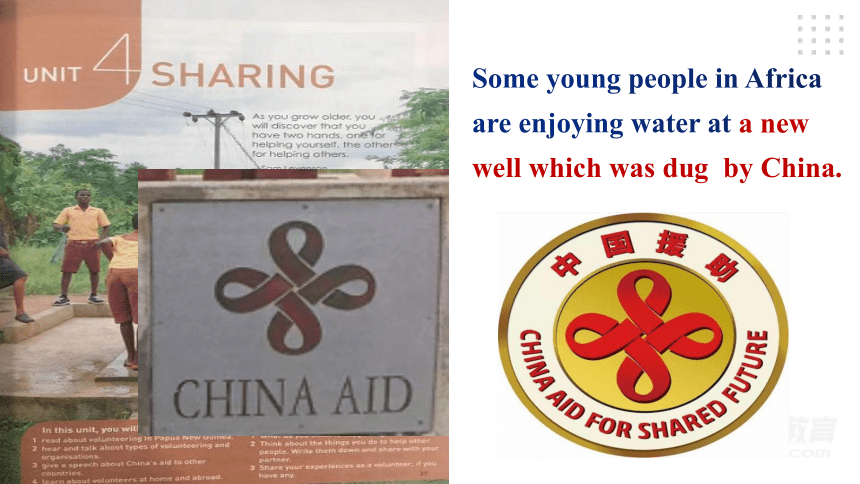
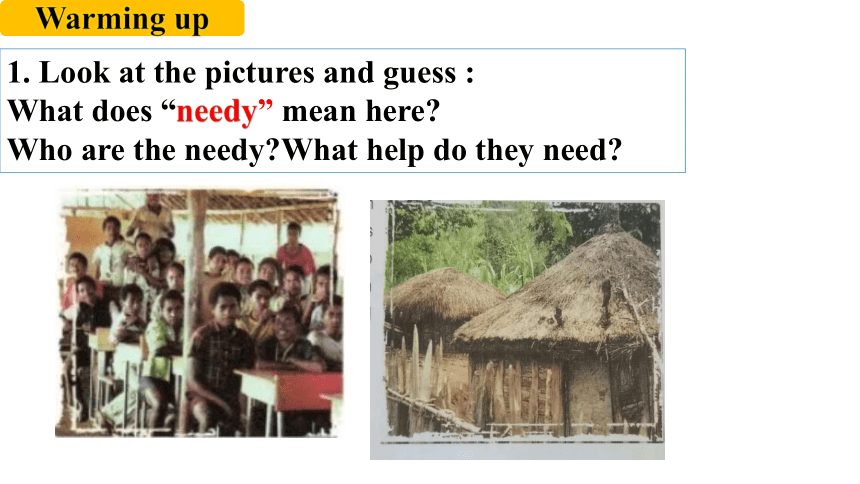
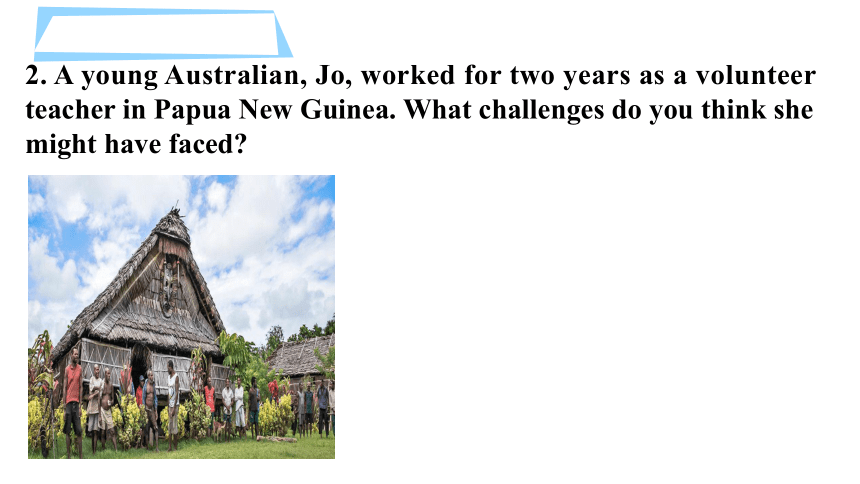
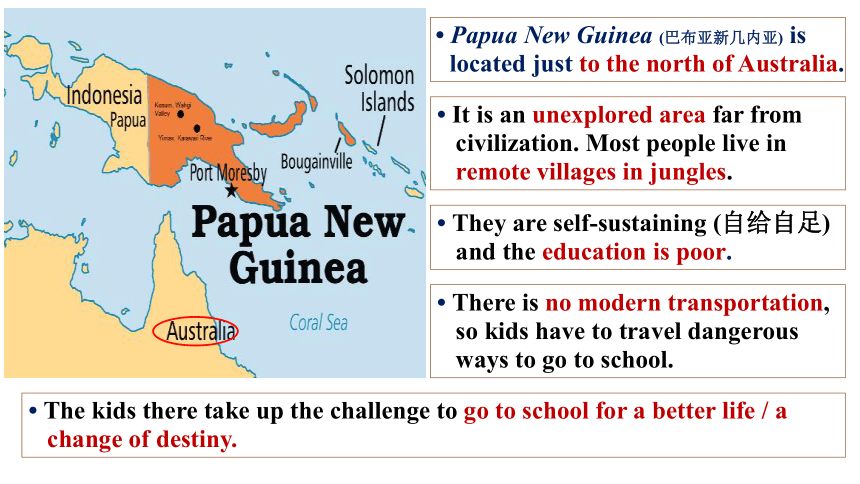
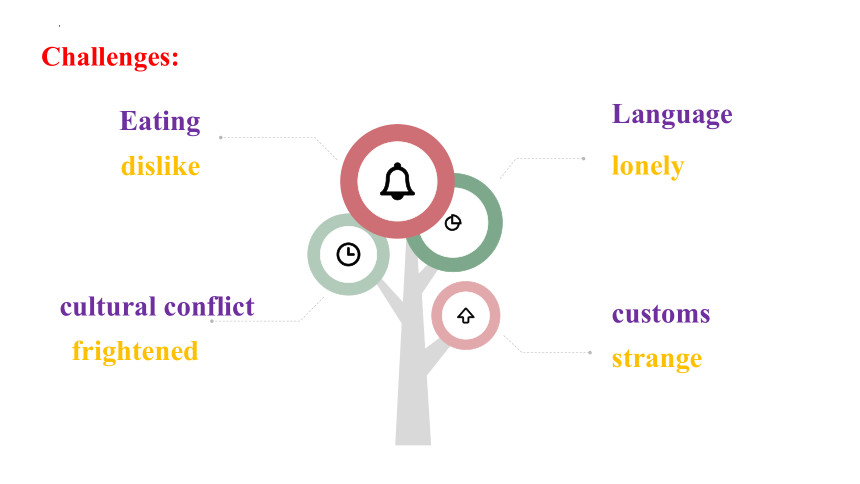
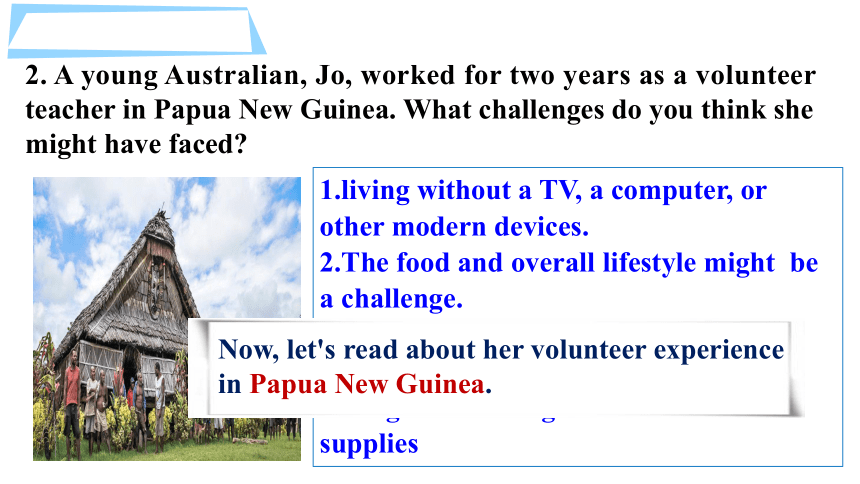
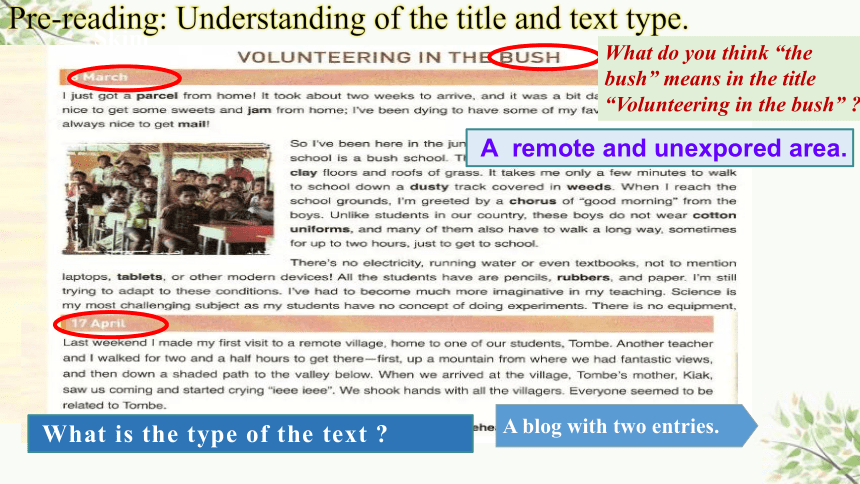
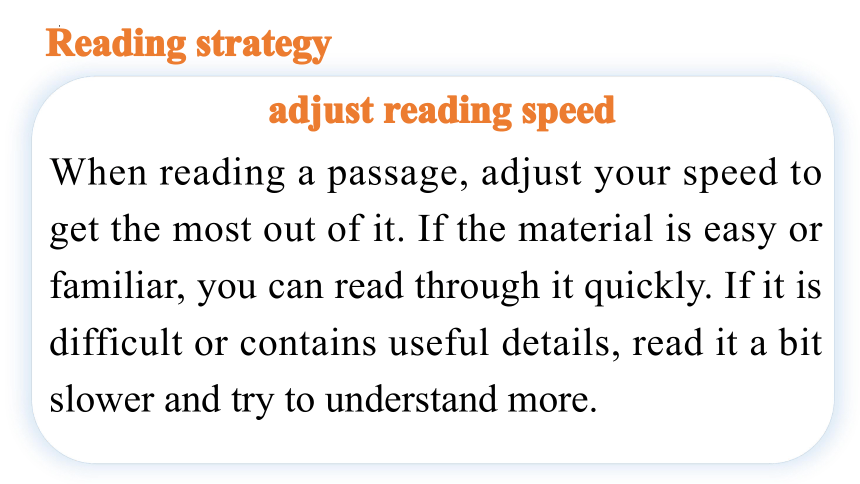
文档简介
(共70张PPT)
UNIT 4 SHARING
Reading and thinking
Help the needy
To read and understand the passage about volunteering in Papua New Guinea.
To know about the education and living conditions in less developed areas.
To increase the awareness of the importance of helping the needy.
As you grow older, you will discover that you have two hands, one for helping yourself, the other for helping others.
–Sam Levenson
How do you understand the quote Can you use some examples to express your understanding of the quote
What do you think is happening in the photo
Share your experiences as a volunteer, if you have any.
Look at the picture on P37 and discuss the questions.
Some young people in Africa are enjoying water at a new well which was dug by China.
Warming up
1. Look at the pictures and guess :
What does “needy” mean here
Who are the needy What help do they need
2. A young Australian, Jo, worked for two years as a volunteer teacher in Papua New Guinea. What challenges do you think she might have faced
Papua New Guinea (巴布亚新几内亚) is
located just to the north of Australia.
It is an unexplored area far from
civilization. Most people live in
remote villages in jungles.
They are self-sustaining (自给自足)
and the education is poor.
There is no modern transportation,
so kids have to travel dangerous
ways to go to school.
The kids there take up the challenge to go to school for a better life / a
change of destiny.
Eating
cultural conflict
Language
customs
dislike
lonely
strange
frightened
Challenges:
2. A young Australian, Jo, worked for two years as a volunteer teacher in Papua New Guinea. What challenges do you think she might have faced
1.living without a TV, a computer, or other modern devices.
2.The food and overall lifestyle might be a challenge.
3. no electricity , no running water ,no washrooms
4. no good teaching materials and supplies
Now, let's read about her volunteer experience in Papua New Guinea.
Skim
A blog with two entries.
Pre-reading: Understanding of the title and text type.
What is the type of the text
What do you think “the
bush” means in the title
“Volunteering in the bush”
A remote and unexpored area.
Reading strategy
When reading a passage, adjust your speed to get the most out of it. If the material is easy or familiar, you can read through it quickly. If it is difficult or contains useful details, read it a bit slower and try to understand more.
adjust reading speed
Task: Divide the two blogs into several parts.
Part1:
Para.1
Part2:
Para. 2-3
Part4:
Part3:
Part5:
Para. 4
Para. 5-7
Para. 8
Para. 1:
C. The author’s feeling after visiting the village.
B. Jo received a parcel from home.
A.What the author witnessed in Tombe’s village.
D. The conditions about the bush school and
the challenges Jo has to be faced with.
Para. 2-3:
Para. 5-7:
Para. 8:
Fast reading: Listen to the text and match the main idea with each part.
Para. 4:
E. How Jo got to Tombe’s home.
1. How did Jo feel when receiving the parcel from home
She was excited to receive the parcel.
2. Which expression shows her feeling
... it was so nice to get some sweets and jam from home ...
... I’ve been dying to have some of my favourite sweets, and it’s always nice to get mail!
3. Why would Jo feel that way What can you infer from the reasons
Because she is expecting the parcel and eager to receive it. It reflects the inconvenience of transportation and express delivery, as well as the lack of essential supplies.
Para 1
a parcel from home
The poor learning condition is described through the sense of .
1. What does the school look like
a ______ school ____________ classroom
____________ floors
____________ roofs
______ track covered in________
bush
sight
bamboo
clay
grass
dusty
weeds
2. How does the students impress Jo
greet me with a ________ of ________
do not wear ________________
walk a ________ way to school
chorus
long
good morning
cotton uniforms
The poor living condition is showed through the sense of ________.
touch
The friendliness of students is showed through the sense of ________.
sound
use senses to visualize the facts
Para 2
conditions about the bush school
A remote and unexpored area
Para 3
challenges Jo has been facing
What they have What they haven’t
running water
textbooks
modern devices
washroom
equipment for experiments
electricity
rubbers
paper
pencils
basic
facilities
learning
equipment
writing
materials
limited education resources
students’ eagerness to be educated
contrast
Doubtful
It’s science, because her students have no experience of doing chemistry experiments.There is no equipment and they are a bit frightened
Jo doubts whether she’s making any difference to these
students’lives.
How does Jo feel about the challenge
What has been Jo’s most challenging subject to teach Why
destination ________’s home——a ________ village
companion
distance ___________________’s walk: first, up a _________, then down a _______ path
reception _____ cried “ _________ ”
_____________ with all villagers
everyone seemed to be __________ Tombe
Tombe
remote
Jenny
two and a half hours
mountain
shaded
Kiak
ieee ieee
shook hands
related to
While reading
Para 4
How Jo got to Tombe’s home
They lead a ________ life.
hospitable
While reading
Para 5-7
What Jo has witnessed in Tombe’s village
Tombe’s life
possession
accommodation
belief
diet
They lead a ____________________ life.
simple/harmonious
Living Condition
Tombe’s house is a low, round____________, with ___________, and with ______ sticking out of the roof.
There are __________ on the floor and a ________ in the
centre of the hut.
grass
bamboo hut
fresh grass
fireplace
no windows
The only possessions in the room are ____________, a few _________, a _______ and so on.
People there cook some vegetables and cover them with ______________ and left them to _______.
Belief: Leftovers attract___________in the night,so any leftover food is ________in a can, which is then____________of the hut.
one broom
banana leaves
saucers
kettle
steam
bad spirits
dried up
thrown out
What was Jo’s feeling after visiting the village
She felt happy and satisfied and she thought it a privilege to have spent a day with Tombe’s family.
Para 8
Jo’s feeling after visiting the village
While reading
Summarize the change of Jo's feelings
excited
happy
discouraging
doubtful
interested
enjoyable
exhausted
happy
worthwhile
receiving the parcel
teaching science
greeted by her students
visiting Tombe's home
after the visit
What makes the change
cultural shock
a
d
j
u
s
t
m
e
n
t
Read the text again and underline the challenges Jo met when volunteering in the bush. Then circle the positive and negative aspects of Jo’s voluntary in the bush.
Critical reading
Volunteering in the bush
Positive aspect
Negative aspect
VOLUNTEERING IN THE BUSH
Positive aspect
Negative aspect
The students value education
Able to get mail
Take only a few minutes to walk to school
The students are friendly
Fantastic scenery
Nice people
Interesting culture
No running water or electricity
The students have no concept of doing experiments
No washroom
The students may not be able to use what they have learnt
Have to walk a long distance to go anywhere
No beds, few possessions
help the needy 帮助有需要的人 2. face challenges 面对挑战
3. compare sth. with sb. 与某人比较某物 4. get the most out of 好好利用
5. be dying to do sth. 渴望做某事 6. secondary school 中学
7. be made of 由……制成 8. a chorus of 齐声;异口同声
9. up to sth. 到达(某数量等) 10. not to mention 更不用说
11. adapt to 适应 12. have no concept of 没有...概念
13. be rigid about 对……严苛 e across 遇见;发现
15. be relevant to 与……相关 16. to be honest老实说;说实话
17. make a difference to 对…有影响 18. have fantastic views美妙的风景
Useful phrases
19. be related to … 与……有亲戚关系
20. a man with a strong jaw and a wrinkled forehead
一个下巴结实额头满是皱纹的男人
21. lead sb to some place带领某人去某地 22. stick out突出,伸出
23. it took/takes sb. time to do sth. 做某事花费某人多长时间
24. cover … with …. 用……把……覆盖
25. upside down 上下颠倒 26. dry out 变干;干透
27. dry up 干涸 28. drag oneself 拖着沉重的步伐
29. It is a previlege to do sth很荣幸做...
Useful phrases
渴望做某事
UNIT 4 SHARING
Reading and thinking
Help the needy
To read and understand the passage about volunteering in Papua New Guinea.
To know about the education and living conditions in less developed areas.
To increase the awareness of the importance of helping the needy.
As you grow older, you will discover that you have two hands, one for helping yourself, the other for helping others.
–Sam Levenson
How do you understand the quote Can you use some examples to express your understanding of the quote
What do you think is happening in the photo
Share your experiences as a volunteer, if you have any.
Look at the picture on P37 and discuss the questions.
Some young people in Africa are enjoying water at a new well which was dug by China.
Warming up
1. Look at the pictures and guess :
What does “needy” mean here
Who are the needy What help do they need
2. A young Australian, Jo, worked for two years as a volunteer teacher in Papua New Guinea. What challenges do you think she might have faced
Papua New Guinea (巴布亚新几内亚) is
located just to the north of Australia.
It is an unexplored area far from
civilization. Most people live in
remote villages in jungles.
They are self-sustaining (自给自足)
and the education is poor.
There is no modern transportation,
so kids have to travel dangerous
ways to go to school.
The kids there take up the challenge to go to school for a better life / a
change of destiny.
Eating
cultural conflict
Language
customs
dislike
lonely
strange
frightened
Challenges:
2. A young Australian, Jo, worked for two years as a volunteer teacher in Papua New Guinea. What challenges do you think she might have faced
1.living without a TV, a computer, or other modern devices.
2.The food and overall lifestyle might be a challenge.
3. no electricity , no running water ,no washrooms
4. no good teaching materials and supplies
Now, let's read about her volunteer experience in Papua New Guinea.
Skim
A blog with two entries.
Pre-reading: Understanding of the title and text type.
What is the type of the text
What do you think “the
bush” means in the title
“Volunteering in the bush”
A remote and unexpored area.
Reading strategy
When reading a passage, adjust your speed to get the most out of it. If the material is easy or familiar, you can read through it quickly. If it is difficult or contains useful details, read it a bit slower and try to understand more.
adjust reading speed
Task: Divide the two blogs into several parts.
Part1:
Para.1
Part2:
Para. 2-3
Part4:
Part3:
Part5:
Para. 4
Para. 5-7
Para. 8
Para. 1:
C. The author’s feeling after visiting the village.
B. Jo received a parcel from home.
A.What the author witnessed in Tombe’s village.
D. The conditions about the bush school and
the challenges Jo has to be faced with.
Para. 2-3:
Para. 5-7:
Para. 8:
Fast reading: Listen to the text and match the main idea with each part.
Para. 4:
E. How Jo got to Tombe’s home.
1. How did Jo feel when receiving the parcel from home
She was excited to receive the parcel.
2. Which expression shows her feeling
... it was so nice to get some sweets and jam from home ...
... I’ve been dying to have some of my favourite sweets, and it’s always nice to get mail!
3. Why would Jo feel that way What can you infer from the reasons
Because she is expecting the parcel and eager to receive it. It reflects the inconvenience of transportation and express delivery, as well as the lack of essential supplies.
Para 1
a parcel from home
The poor learning condition is described through the sense of .
1. What does the school look like
a ______ school ____________ classroom
____________ floors
____________ roofs
______ track covered in________
bush
sight
bamboo
clay
grass
dusty
weeds
2. How does the students impress Jo
greet me with a ________ of ________
do not wear ________________
walk a ________ way to school
chorus
long
good morning
cotton uniforms
The poor living condition is showed through the sense of ________.
touch
The friendliness of students is showed through the sense of ________.
sound
use senses to visualize the facts
Para 2
conditions about the bush school
A remote and unexpored area
Para 3
challenges Jo has been facing
What they have What they haven’t
running water
textbooks
modern devices
washroom
equipment for experiments
electricity
rubbers
paper
pencils
basic
facilities
learning
equipment
writing
materials
limited education resources
students’ eagerness to be educated
contrast
Doubtful
It’s science, because her students have no experience of doing chemistry experiments.There is no equipment and they are a bit frightened
Jo doubts whether she’s making any difference to these
students’lives.
How does Jo feel about the challenge
What has been Jo’s most challenging subject to teach Why
destination ________’s home——a ________ village
companion
distance ___________________’s walk: first, up a _________, then down a _______ path
reception _____ cried “ _________ ”
_____________ with all villagers
everyone seemed to be __________ Tombe
Tombe
remote
Jenny
two and a half hours
mountain
shaded
Kiak
ieee ieee
shook hands
related to
While reading
Para 4
How Jo got to Tombe’s home
They lead a ________ life.
hospitable
While reading
Para 5-7
What Jo has witnessed in Tombe’s village
Tombe’s life
possession
accommodation
belief
diet
They lead a ____________________ life.
simple/harmonious
Living Condition
Tombe’s house is a low, round____________, with ___________, and with ______ sticking out of the roof.
There are __________ on the floor and a ________ in the
centre of the hut.
grass
bamboo hut
fresh grass
fireplace
no windows
The only possessions in the room are ____________, a few _________, a _______ and so on.
People there cook some vegetables and cover them with ______________ and left them to _______.
Belief: Leftovers attract___________in the night,so any leftover food is ________in a can, which is then____________of the hut.
one broom
banana leaves
saucers
kettle
steam
bad spirits
dried up
thrown out
What was Jo’s feeling after visiting the village
She felt happy and satisfied and she thought it a privilege to have spent a day with Tombe’s family.
Para 8
Jo’s feeling after visiting the village
While reading
Summarize the change of Jo's feelings
excited
happy
discouraging
doubtful
interested
enjoyable
exhausted
happy
worthwhile
receiving the parcel
teaching science
greeted by her students
visiting Tombe's home
after the visit
What makes the change
cultural shock
a
d
j
u
s
t
m
e
n
t
Read the text again and underline the challenges Jo met when volunteering in the bush. Then circle the positive and negative aspects of Jo’s voluntary in the bush.
Critical reading
Volunteering in the bush
Positive aspect
Negative aspect
VOLUNTEERING IN THE BUSH
Positive aspect
Negative aspect
The students value education
Able to get mail
Take only a few minutes to walk to school
The students are friendly
Fantastic scenery
Nice people
Interesting culture
No running water or electricity
The students have no concept of doing experiments
No washroom
The students may not be able to use what they have learnt
Have to walk a long distance to go anywhere
No beds, few possessions
help the needy 帮助有需要的人 2. face challenges 面对挑战
3. compare sth. with sb. 与某人比较某物 4. get the most out of 好好利用
5. be dying to do sth. 渴望做某事 6. secondary school 中学
7. be made of 由……制成 8. a chorus of 齐声;异口同声
9. up to sth. 到达(某数量等) 10. not to mention 更不用说
11. adapt to 适应 12. have no concept of 没有...概念
13. be rigid about 对……严苛 e across 遇见;发现
15. be relevant to 与……相关 16. to be honest老实说;说实话
17. make a difference to 对…有影响 18. have fantastic views美妙的风景
Useful phrases
19. be related to … 与……有亲戚关系
20. a man with a strong jaw and a wrinkled forehead
一个下巴结实额头满是皱纹的男人
21. lead sb to some place带领某人去某地 22. stick out突出,伸出
23. it took/takes sb. time to do sth. 做某事花费某人多长时间
24. cover … with …. 用……把……覆盖
25. upside down 上下颠倒 26. dry out 变干;干透
27. dry up 干涸 28. drag oneself 拖着沉重的步伐
29. It is a previlege to do sth很荣幸做...
Useful phrases
渴望做某事
